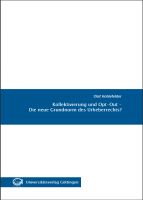Kollektivierung und Opt-Out - Die neue Grundnorm des Urheberrechts? - Modelle im Vergleich: Google Books Settlement, §1371 UrhG, Richtlinie Orphan Works und die Wahrnehmungsbefugnis der VG Wort
Author(s)
Hohlefelder, Olaf,
Collection
AG UniversitätsverlageLanguage
GermanAbstract
The German Copyright Law grants an absolute right to authors, i.e., any use of protected works requires the author's prior consent. This concept is known as opt-in. In this doctoral thesis the author examines five models which turn this concept upside down as they provide for the permission for certain beneficiaries to use protected works without the author's prior consent until the author objects to such use. This concept is known as opt-out. Also, the examined models contain elements of collectivization and, in particular, involve collecting societies. The author examines and compares these models and answers the question whether the underlying opt-out concept together with collectivization may be generalized so that it could replace opt-in. Das Urheberrecht ist als absolutes Ausschließlichkeitsrecht ausgestaltet, d. h. für jede rechtmäßige Nutzung durch Dritte ist die Zustimmung des Urhebers notwendig. Dafür hat sich im Urheberrecht der Begriff Opt-In etabliert. Der Autor vergleicht vier Regelungsmodelle, die dieses Grundkonzept auf den Kopf stellen und es Begünstigten erlauben, urheberrechtlich geschützte Werke ohne vorherige Zustimmung zu nutzen, solange der Rechtsinhaber dieser Nutzung nicht widerspricht. Derartige Konzepte werden als Opt-Out-Modelle bezeichnet. Zugleich binden die Modelle Elemente der kollektiven Verwertung und insbesondere Verwertungsgesellschaften ein. Der Autor untersucht diese Modelle umfassend und vergleicht sie. Schließlich beantwortet der Autor die Frage, ob die verschiedenen Modelle verallgemeinerungsfähig sind, sodass Opt-In zugunsten Opt-Out verdrängt werden könnte.
Keywords
opt-out; copyright; intellectual property rights; industrial property rights; Berner Übereinkunft zum Schutz von Werken der Literatur und Kunst; Google; Rechtsinhaber; Urheber; Urheberrecht; Urheberrechtsgesetz (Deutschland); Verwertungsgesellschaft; Verwertungsgesellschaft WortDOI
10.17875/gup2015-894ISBN
9783863952235OCN
1030819730Publisher
Universitätsverlag GöttingenPublication date and place
2015Classification
Law


 Download
Download Web Shop
Web Shop